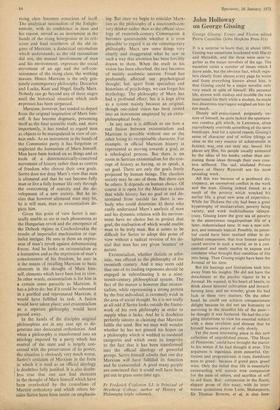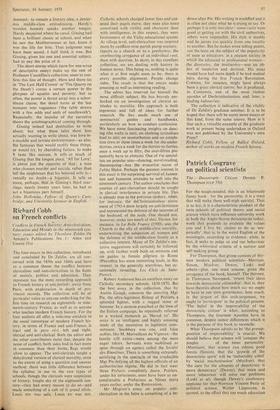John Holloway on George Gissing
It is a surprise to learn that, in about 1890, Gissing was sometimes bracketed with Hardy and Meredith, and the three were seen to- gether as the major novelists of the age. The equation raises a number of issues which I leave aside, but the obvious fact, which regis- ters clearly from almost every page he wrote and from everything known about him, is that Gissing could be a major novelist only very much in spite of himself. His personal life, strewn with mishap and muddle (he was imprisoned for theft while a student, he made two disastrous marriages) weighed on him far too much.
Deeply self-preoccupied, poignantly un- sure of himself, he quite lacked the spontane- ous creative gift which, in Lawrence, often marvellously overrode something of the same handicaps. And for a special reason, Gissing's sense of character and of milieu (things so close to the very essence of achievement in fiction), was, one can only say, lamed. His places are thin, his people usually animated by the ideas of his books, rather than ani- mating those ideas through their own crea- tive selfhood. The sad, etiolated Private Papers of Henry Ryecroft are his most revealing work.
All this was because of a profound dis- crepancy, an unresolved conflict in the work and the man. Gissing indeed found, as a result of the poverty which wrecked his earlier life, a great new area of experience. While for Dickens the city had been a great hypertrophy of mediaevalism, poverty being variety, and work multitudinous idiosyn- crasy, Gissing knew the grey sea of poverty in the anonymous megalopolitan life of a later, industrialised time. It was a new sub- ject, and intensely topical. Possibly, its poten- tial could have been realised either in de- lighted compassion, that true human quality could survive in such a world; or in a con- centrated and steely resolve to., expose and condemn what brought that condition of life into being, Then Gissing might have been the Juvenal of his time.
But his leanings and limitations took him away from his insights. He did not have the detachment or the psychic vigour to be a Juvenal. He wanted, in his heart of hearts, to think about leisured cultivation and inward- turning love; and no wonder, given his bad luck in these very matters. On the other band, he could not achieve compassionate delight because he did not see humanity as surviving in the dreadful life of the poor— he thought it was forfeited. He had the crip pling misfortune to view his essential subject with a deep revulsion and distaste that he himself became aware of only slowly.
Yet the most interesting piece in this new collection of unpublished pieces, 'The Hope of Pessimism,' could have brought the matter to .his notice if he had thought it over. The argument is ingenious, even powerful. Op- timism and progressivism, it runs, foredoom men to greed : because if greed pays, greed
wins. Only the belief that life is essentially unrewarding will sustain true compassion for the pain of others, and sacrifice of self to aid them. But: compassion in the fluent, elegant prose of this essay, with its inter- woven quotations from Latin, Shakespeare, Sir Thomas Browne, et al, is also fore-
doomed: to remain a literary idea, a dexter- ous middle-class attitudinising. Hardy's wooden honesty speaks another tongue; Hardy despaired where he cared. Gissing had been a brilliant classic at school, and when he saw the Mediterranean at last, knew it was the life for him. That judgment may have been sound. 1 half think it was. But Gissing, given his one and essential subject, had to pay the price of it.
The short stories which (save for one scrap of descriptive essay) make up the rest of Professor Coustillas's collection, seem to con- firm this line of thought. Here and there (as in 'The Last Half-Crown' or The Quarry on the Heath') comes a certain power in the glimpses of squalor and poverty; but so often, the power is thrust away into a subor- dinate clause, the detail turns at the last moment into vagueness ('the table strewn with a few odds and ends of needlework'). Repeatedly, the impulse of the narrative shows the autobiographical coming through.
Gissing indeed had destitution to write about; but what these tales show him actually wanting to write about, was love-in- a-muddle and private embitterment—as also, the fantasies that would rectify these things, or would try, by cherishing failure, to make It taste like success. It tells us much of Gissing that the longest piece, 'All for Love', is about just the opposite of that: a man who chooses murder and suicide, rather than tell the neighbours that his beloved wife is— venially no doubt—a bigamist. It tells us more, perhaps, that in Gissing's third mar- riage, nearly twenty years later, he had to act a bigamous part himself.
John Holloway, Fellow of Queen's Cam- bridge, and University lecturer in English.











































 Previous page
Previous page